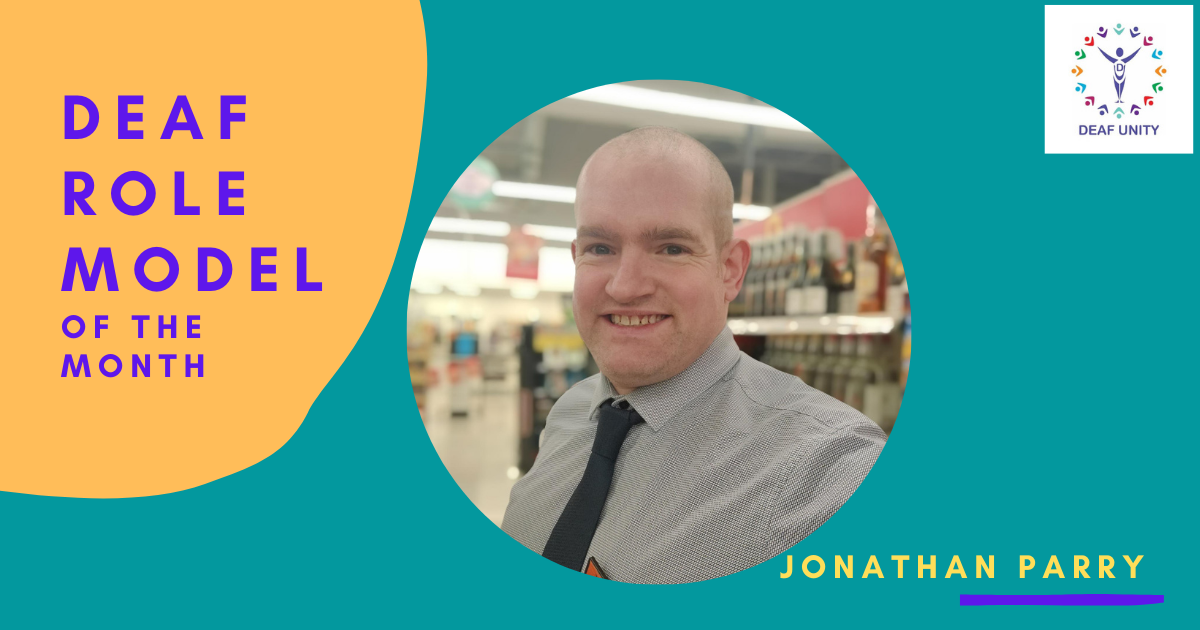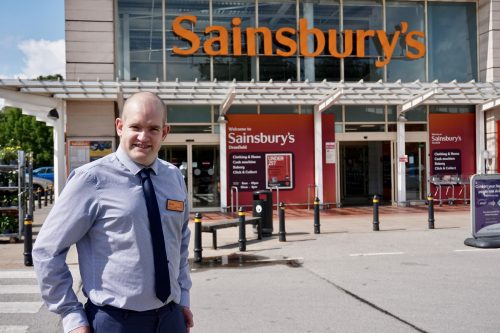 Each month we invite an inspirational or outstanding deaf role model to share their story. From what they’ve learnt, to what they wish they’d have known and their best deaf tips.
Each month we invite an inspirational or outstanding deaf role model to share their story. From what they’ve learnt, to what they wish they’d have known and their best deaf tips.
Our role model this month is a someone who has climbed the ladder in the workplace and proven that a deaf person can thrive and become a manager. Watch his story in BSL or read the transcript below.
1. Hi Jonathan! Congratulations on being a Deaf Role Model – tell us about yourself.
I work for Sainsbury’s as a manager in the food department. I have been in the role for about 3 and a half years in a branch in Dronfield, near Sheffield. I manage a team of about 40 people. There are 10 managers in the store, one general manager, six managers and three night shift managers. Altogether, I think there are about 135 members of staff in our store. I started working at Sainsbury’s part time in 2005 in the frozen food department. I got the job through the Job Centre. Back then, my brother interpreted for me but they don’t allow friends and family to interpret anymore. I worked at Sainsbury’s part time for about two years and then became a team leader in the food department. I moved around different departments a bit. In 2009, I moved back to Derbyshire to live with my father and I met my wife and we moved to Chesterfield where we live now with our young son. I am the only deaf person in our family, the rest of my family are hearing. Most of my family, including my mum, dad, step-dad, brother and two sisters, sign BSL.
2. Did you grow up in the Deaf Community or come to it later in life?
I went to the Royal School for the Deaf, Derby (RSD) so I was immersed in the Deaf community growing up and had a strong Deaf identity. I am still involved in my local Deaf community here in Chesterfield and also sometimes visit Sheffield as well. I love meeting deaf people.
3. What was your experience of education as a deaf person?
My experience of education has been good, I was lucky because I went to a Deaf school so I had full access to my education in BSL. The one disappointing feature of my education is that I didn’t really have the opportunity to learn English until college. I did GCSE English at college and achieved a D which I’m happy with.
4. What kind of career advice did you receive as a young deaf person?
Looking back, I can’t really remember receiving much! I remember looking into college and university to pursue computing. I had an avid interest in computing and 20 years ago, the field was just emerging and had an increasing demand, and deaf people were encouraged to enter that field. I did go to college, but it didn’t really work out for me.
5. How have you found working in a hearing world as a deaf person – what obstacles have you faced and how have you overcome them?
I was lucky because I grew up in a hearing family that signed but it did come with a lot of frustration and underlying tension. My grandparents and extended family couldn’t sign so that was difficult and created barriers. If we had family meals with extended family I had to ask my brother to interpret for me or I had to ask my mum ‘what did they say?’ all the time. When I went to work I didn’t want to feel the same way I felt at those family meals. I am very lucky; I work with a lot of hearing people and they’re fantastic. They don’t shy away from coming up to me and they treat me like anyone else, adjusting how we communicate so we understand each other.
Obviously, there are a couple of people where we have struggled to communicate, but we’ve tried to find ways to work together and not just given up. I think you have to have empathy with hearing people and try to find a middle ground and a way to meet both people’s communication needs. You need to be adaptable and use the full range of what is available: not only speech but utilising text, email, WhatsApp, gestures and lipreading. There are so many different ways to communicate, you just have to find a way that works for all involved in the situation.
6. What advice would you give to someone who is struggling to find work?
I would advise anyone who is attending an interview, to bring solutions for your communication needs. For example, make sure you can educate employers on Access to Work. Be prepared for them to ask questions about your deafness and communication issues and be armed with positive solutions. Employers might be quite nervous about employing a deaf person so you need to be able to allay their fears and reassure them that you have the solutions to any communication barriers that might arise. You can use examples of previous times you have worked to successfully overcome barriers and what skills you have acquired. It might be from courses you have attended, Duke of Edinburgh and other roles, which is why it is important to get involved in volunteering opportunities to learn about leadership and other skills.

7. Have you accessed the Access to Work scheme? What has been your experience?
I have two forms of Access to Work (AtW) support, I have face-to-face interpreters two afternoons a week and I also have VRS interpreters. I prefer face-to-face interpreters but both types of support are really good. My experience of AtW is generally good, but I’m still campaigning for full digital access because there is a lot of paperwork. I would like it to be digitised so I can email invoices and claim forms instead of printing and posting them.
8. Who inspires you and why?
There are two people who have inspired me since I was young. Growing up I really looked up to Terry Riley, the Chair of the British Deaf Association (BDA) at that time. He is an empowered Deaf man who signed so wonderfully. He achieved so many things as the Chair of the BDA. Also, Clive Mason, he was presenter on SeeHear when I was growing up. I’ve loved watching him on so many programmes and his in-vision work. He’s also profoundly deaf and very inspirational to me.
9. What ways do you think hearing people can be allies to the deaf community? Any DOs and DON’Ts?
When people come and say, ‘oh, I’ve always wanted to learn sign language’ I always say: go and learn it! Even just learning a few phrases, like ‘thank you’, ‘good morning’, etc is great. If you want to learn BSL, do a course. People have to be open-minded as well. Learn about deaf people and the community, we’re not all the same. We all have our own preferred means of communicating. You might have family or cousins that are deaf but you can’t assume that all deaf people are the same.
10. 3 top tips for deaf people?
1. Don’t show your frustration or get angry with people: If you get angry or frustrated with people they tend to withdraw or get defensive. If you’re smiling and friendly people are more likely to try harder to communicate with you. Let them ask questions, even stupid ones! I get a lot of questions at work about my deafness as they know I am approachable. If people know you are going to be receptive to questions and not get angry, you all get along better and can work well together.
2. Have empathy: Some hearing people have never met a deaf person before and get a bit frightened or nervous. You’ve got to help each other. You can take the lead in a situation by offering solutions, like typing on your phone to communicate.
3. Be prepared to adjust: If one method of communication isn’t working, try something else. Different scenarios need different solutions and require you to be innovative. For example, if you need to use a door intercom, you could ask a hearing person to speak for you or try to find another way to contact reception. The key is to not get frustrated in these situations.
Looking for more support? We’ve made it our mission to improve the lives of deaf people everywhere. Check out Deaf Unity’s projects to find out what we can do for you. If you’d like to get in touch, contact us here.
